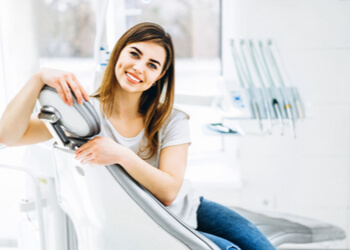Many people want whiter teeth but understandably, some are nervous about the effects of teeth bleaching. So is teeth whitening safe?
The fact is, the teeth whitening industry as a whole is growing rapidly and is set to be worth $7.4 billion by 2024. According to one 2014 survey, 93% of Australian grocery buyers purchased at least one teeth whitening product during a period of 6 months. That’s 20 million Australians (give or take) who have exchanged their hard-earned cash for products or services that they believe will give them a brighter whiter smile.
But what about overseas…
In 2018, 40.5 million Americans bought teeth whitening products totalling around $1.4 billion and in the UK, around £100 million is spent on tooth whitening toothpaste as well as electric toothbrushes each year alone. But with easy access to an abundance of home whitening toothpaste, gels, strips, kits and pens, it begs the question, just how safe is teeth whitening?
The first thing to note is that the teeth whitening industry as a whole is heavily regulated. There are strict guidelines equating to the amount of bleaching agent allowed within certain products. However, this does vary greatly from one country to another.
In Australia, for example, products manufactured for home use can legally contain up to 6% hydrogen peroxide and 18% carbamide peroxide, whereas in the UK, products issued by non-dentists are allowed to contain just 0.1%.
In the US (just like Australia) the American Dental Association (ADA) recognise that up to 6% hydrogen peroxide is a safe limit to use on at-home teeth whitening products, while in India, limitations are higher. Paint-on teeth whiteners, for example, containing up to 8.7% hydrogen peroxide are commonly sold.
Safety problems with over-the-counter whitening products
While some over-the-counter (OTC) products naturally work better than others, problems can arise when guidelines aren’t followed and overuse or misuse can be an issue. There is a possibility that doing either of the above could result in extreme tooth sensitivity.
Alternatively, because OTC products are mass-manufactured, they become a one-size-fits- all product.
Take at-home whitening kits for example – the type where whitening trays are worn over the teeth either during the day or at night and utilise whitening gels. By their very nature, the clear plastic trays designed to fit snugly over the teeth won’t fit everyone perfectly. As a result, there remains a possibility that some of the whitening agent could leak out onto the gums. This, in turn, can cause mild irritation or burning.
So how can you be sure that teeth whitening treatment is indeed both effective and safe?
The answer is to ‘go pro’!
Professional teeth whitening – E.g. that for which you see your local dentist – is arguably safer for several reasons.
Firstly, higher concentrations of whitening material are legally allowed to be used, but also each process (whether that’s chair-side teeth whitening or take-home teeth whitening) is carefully controlled.
Ultimately, patients are better equipped to achieve the whiter, brighter smile they want, but more importantly, because treatments are under the guidance of a dental professional, there is less room for misuse/overuse.
 Another reason why professional teeth whitening is safer is that every treatment is tailored to you and your mouth.
Another reason why professional teeth whitening is safer is that every treatment is tailored to you and your mouth.
Take-home trays issued by your local dentist, for example, are custom made to fit your teeth exactly.
This means there is little to no chance of whitening gel leakage provided you follow the instructions carefully.
Whereas with in-clinic treatments, great care is taken to ensure your gums are well and truly covered and protected to avoid any contact with the whitening agent.
But what about the tooth sensitivity issue?
People will indeed respond to teeth whitening treatment in different ways. Unfortunately, you won’t always know how your teeth will react when you buy over-the-counter whitening products and use them for the first time.
A dentist, on the other hand, will always give you a thorough oral examination before issuing you with a take-home kit or allowing you to undergo chair-side teeth whitening. This way, the likelihood of extreme tooth sensitivity during or after treatment is limited.
Is teeth whitening safe? The key takeaway
While you can never guarantee that the effects of teeth whitening are always going to be problem-free, there are steps that you can and should take, to limit the possibility of any issues occurring.
If you are considering over-the-counter whitening products, for example, ensure they fall within the legal guidelines. Buy them from a reputable store and not online and always follow the instructions carefully. Even If they aren’t giving you the required whiteness you expected, it’s advisable not to use them more than instructed.
Alternatively, if you are considering chair-side teeth whitening, don’t seek out treatment by anyone other than a professional dentist. For one, it’s illegal in Australia for non-dentists to practice chair-side teeth whitening – and secondly, non-dentists aren’t trained to recognise when you may be at risk from tooth sensitivity.
If you follow these guidelines, then teeth whitening can be both effective and safe. Why not contact our experienced team at Dental 266 and see how we can help you to achieve the brighter whiter smile you want. Call us on (02) 9051 0600 to book an appointment today.

